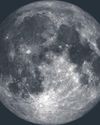
Volcanic eruptions and magma flows could be taking place on the surface of Venus, researchers from the University of Alaska Fairbanks Geophysical Institute have found. The team studied data collected by NASA's Magellan space probe in the 1990s, taking advantage of new techniques that allow them to compare digital images more efficiently. Their analysis focused on an area containing two of Venus's largest volcanoes, Ozza Mons and Maat Mons. They discovered a roughly 2.5km² volcanic vent that changed shape and altered in size over a period of eight months in 1991 on Maat Mons. On Earth, changes of this magnitude are often indications of volcanic activity.
"It is really only in the last decade or so that the Magellan data has been available at full resolution, mosaicked and easily manipulable by an investigator with a typical personal workstation," said Robert Herrick, a research professor at the University of Alaska Fairbanks, who led the research. "Ozza and Maat Mons are comparable in volume to Earth's largest volcanoes, but have lower slopes and thus are more spread out."
This story is from the May/June 2023 edition of Very Interesting.
Start your 7-day Magzter GOLD free trial to access thousands of curated premium stories, and 8,500+ magazines and newspapers.
Already a subscriber ? Sign In
This story is from the May/June 2023 edition of Very Interesting.
Start your 7-day Magzter GOLD free trial to access thousands of curated premium stories, and 8,500+ magazines and newspapers.
Already a subscriber? Sign In

HOW TO MASTER YOUR METABOLISM
Ready to welcome a leaner, healthier you? It's time for a metabolic makeover. With a few simple, research-backed changes, you can supercharge your body's calorie-burning

A BLUEPRINT FOR ANTI AGEING
Science says it's time to rethink - and take control - of our body's age. Here's how to slow, halt and potentially turn back your biological clock

THE BROKEN MIRROR
Body dysmorphia - the all-consuming obsession with perceived flaws in our looks - is sweeping the globe. One in five young people is thought to be affected. What can be done and how is tech changing the way we see ourselves?

SCROLL REVERSAL
Losing days by endlessly scrolling on your smartphone? You're not alone. Perhaps neuroscience can help us beat the urge

Going back to the moon
ARTEMIS AND A NEW DAWN OF LUNAR EXPLORATION

SAD CLOWN PARADOX: WHY TEARS OFTEN LIE BEHIND THE LAUGHS
Mental health issues are common among comedians and performing is just one way they can self-medicate

INDOOR AIR POLLUTION: HOW COOKING CAN DAMAGE YOUR DNA
From roast dinners to scented candles, there are potentially harmful pollutants lurking in every home

FARM OF THE FUTURE
Join the BBC's Planet Earth III film crew and go behind the scenes in the city farm that's transforming fields into towers and running almost everything with robots

COULD ONE BOMB DESTROY THE WORLD?
How big a bang are arms manufacturers capable of creating?

THE THREAT OF DAY ZERO
Queues at public water taps could become normal. What can we do to avoid them?